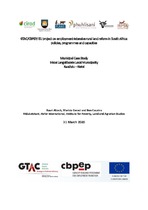Municipal Case Study: Inkosi Langalibalele Local Municipality KwaZulu – Natal
Abstract
This report presents a case study of Inkosi Local Municipality in KwaZulu-Natal. The goal of the report is to examine the employment creation potential of land redistribution in Inkosi Langalibalele, and its cost.
The Inkosi Langalibalele Local Municipality is located within the Uthukela District Municipality, in a broader region known as the KwaZulu-Natal Midlands. Agriculture is the predominant form of land use in the local municipality, but it does not generate a large number of jobs. Large-scale commercial farming remains important but is shrinking due to land reform, which affects around 38 percent of the land in the municipality. Another 36 percent of the local municipality is designated as ‘communal areas’, with traditional authority structures playing a key role in their governance. Only 27 percent of the municipality, or around 100 000 hectares, is available for further land reform.
The local municipality had a total population of 215 183 persons in 46 952 households in 2016 and comprises 3 403 square kilometres, with a population density of 63.2 people per square kilometre. Only around one fifth of the adult population aged 15 or more are employed, compared to 23 percent in Uthukela district municipality, and 31.5 percent in KZN. Of those employed, 74 percent work in the formal sector. Over half of the population (52 percent) is ‘not economically active’, but many of these are engaged in subsistence-oriented agriculture, mainly in order to produce some additional food for home consumption. The great majority of the population in Inkosi Langalibalele is poor and highly dependent on social grants, and services have improved greatly since the advent of democracy in 1994. Despite the rural nature of the municipality, settlement patterns are increasingly dense and ‘urban’ in character, even some distance away from established towns. Large areas comprise densely settled communal areas under traditional councils.

